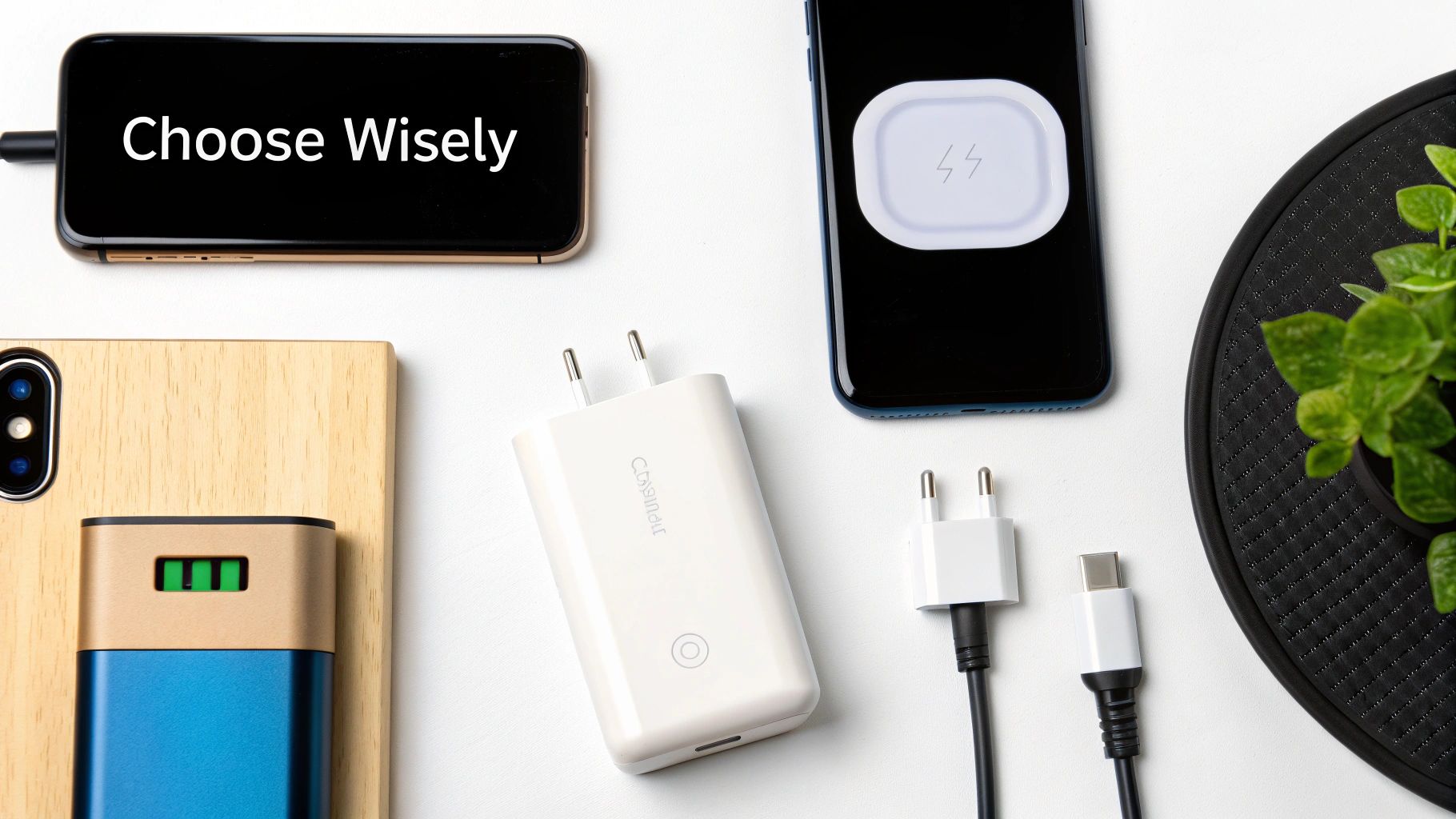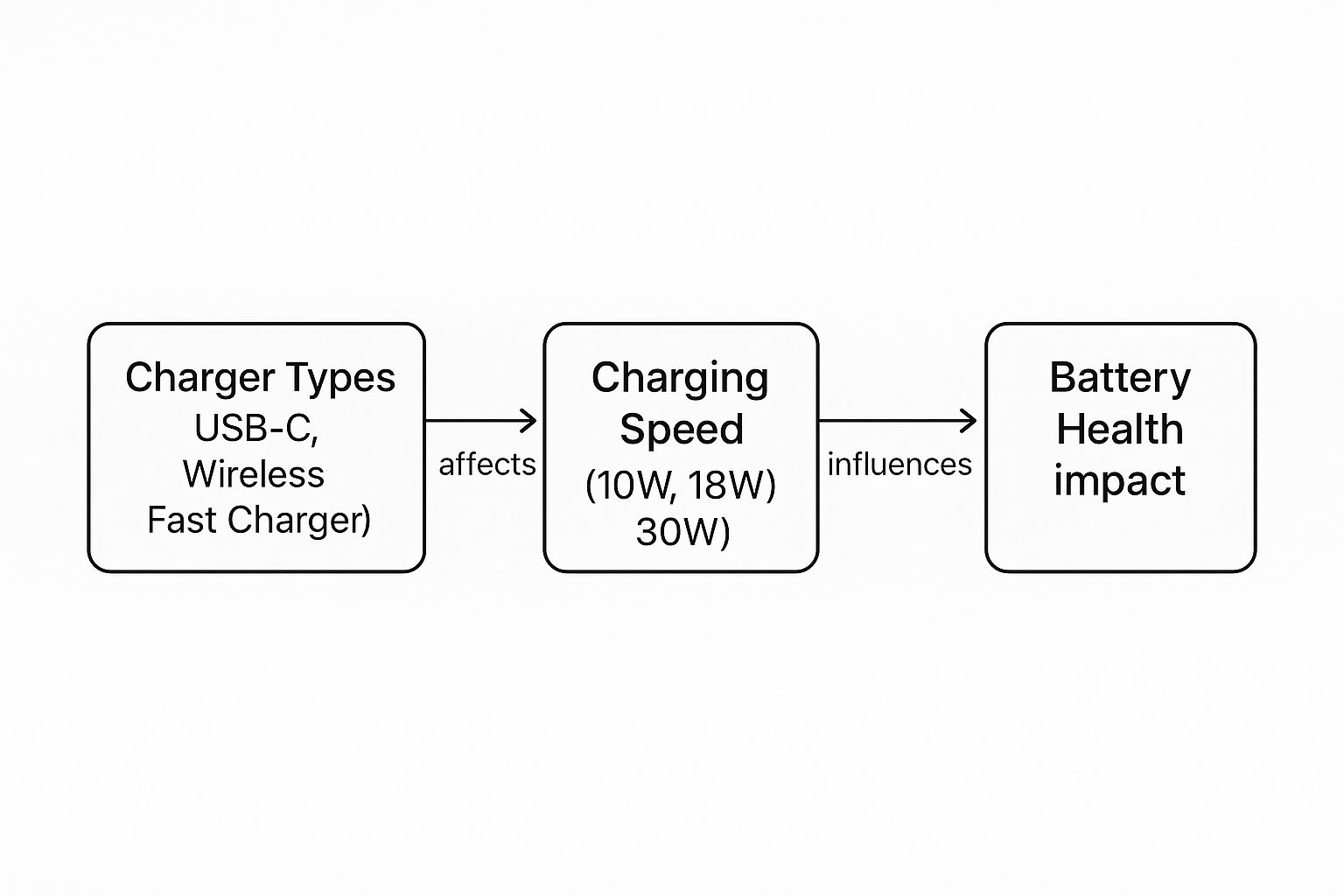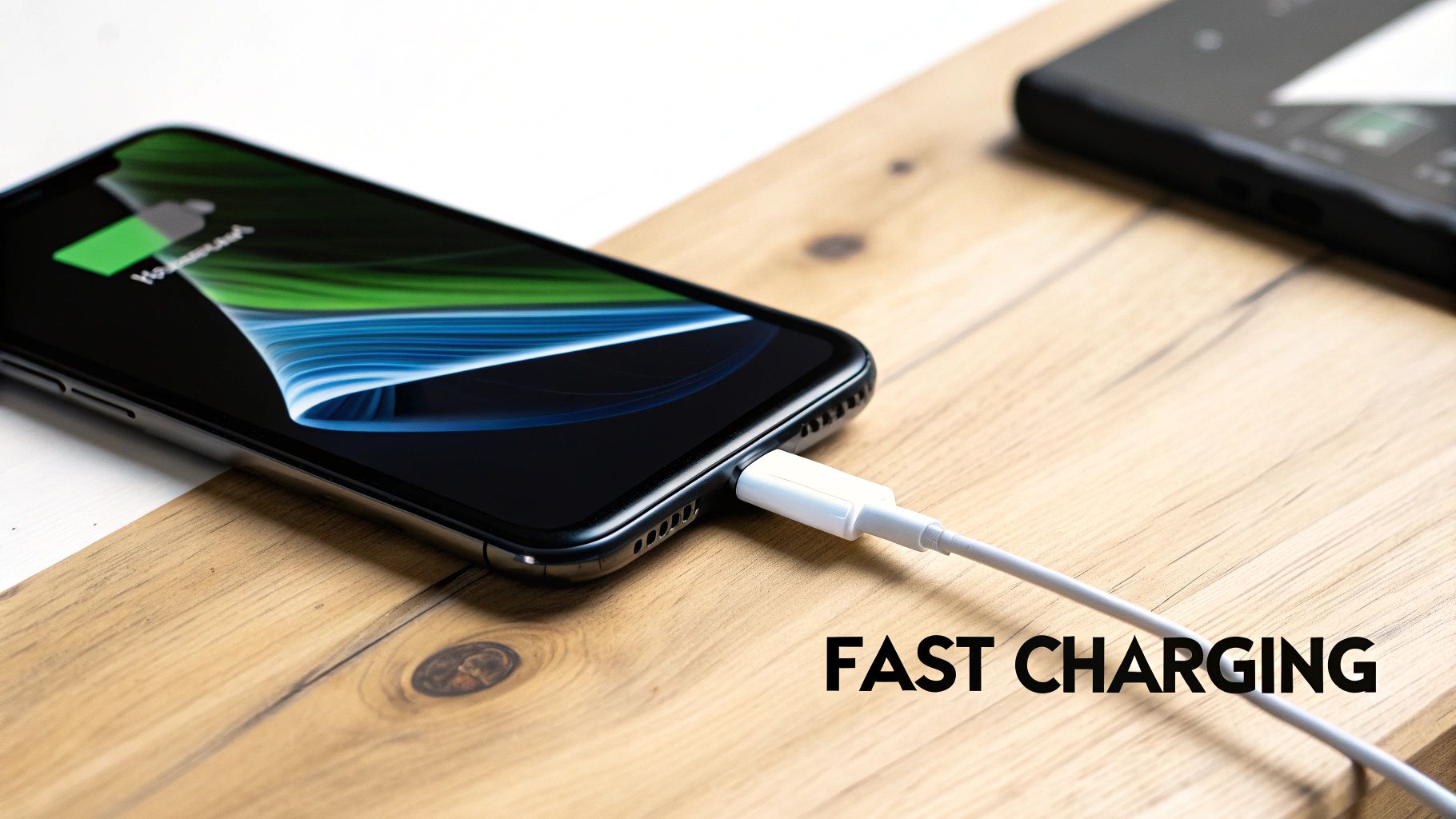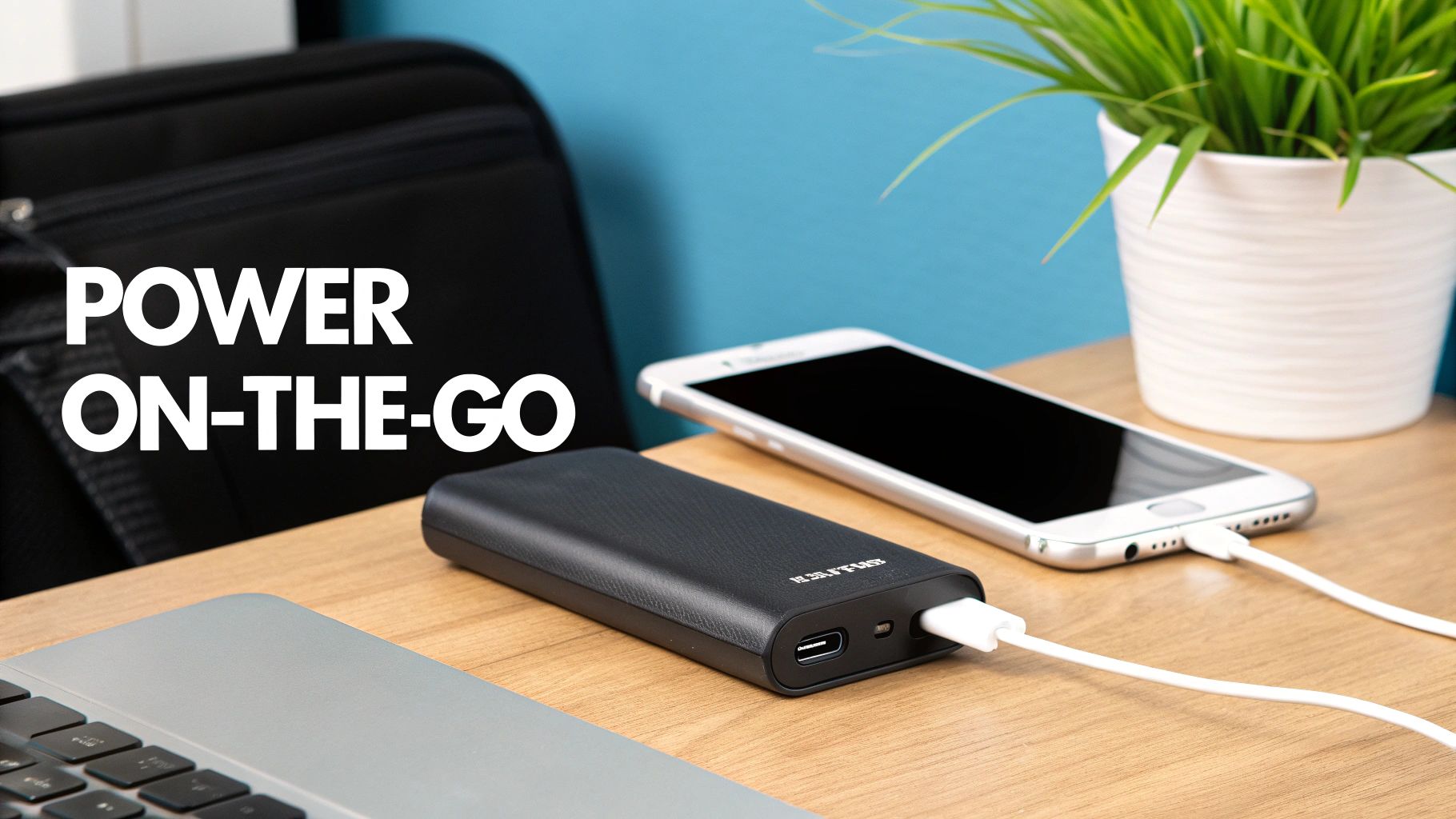How to Choose the Right Charger in New Zealand
It’s easy to think a charger is just a charger, but grabbing a generic one for your specialised communication equipment is a risk that simply isn’t worth taking. Using the wrong charger can cripple performance, slash battery life, and could even permanently fry your essential devices.
Why Your Communication Gear Needs the Right Charger
Choosing a charger for professional kit like a Motorola two-way radio or a GME marine VHF is a world away from picking one up for your smartphone. This gear is built tough for demanding environments, and its power systems are precision-engineered to match. Introducing an incompatible or cheap charger into the mix opens the door to a host of problems that undermine that built-in reliability.

A mismatched charger can feed your device the wrong voltage or amperage, leading to inefficient charging that slowly degrades the battery's cells. Before you know it, your device won't hold its charge, leaving you disconnected when it matters most.
The Risks of a Generic Charger
The fallout from using the wrong power supply goes beyond just poor performance. An incorrect charger can trigger serious issues, putting both your equipment and your safety on the line.
- Permanent Battery Damage: Consistently using a charger with the wrong specs can permanently gut a battery's capacity or kill it completely. This is especially true for the advanced lithium-ion batteries found in modern radios.
- Device Malfunction: The sensitive electronics inside your communication gear can be easily damaged by power surges or incorrect voltage from a generic charger.
- Safety Hazards: In a worst-case scenario, an improper charger can cause a battery to overheat, creating a very real fire risk—something you definitely don't want in a vehicle, boat, or workshop.
When your critical communication network hangs on reliable power, guesswork is not an option. A specialist-approved charger is the only way to guarantee the safety, performance, and longevity of your equipment.
Sourcing the Correct Solution in New Zealand
This is exactly why getting advice from a specialist is so important. Here in New Zealand, Mobile Systems Limited is the go-to expert for battery and charging maintenance and servicing for professional communication devices. Unlike general electronics retailers with generic stock and limited product knowledge, our team understands the specific power needs for everything from a Uniden CB radio to a complex Tait digital mobile radio network.
If you need to source a replacement charger, we'll make sure you get the exact manufacturer-approved model. It’s the simplest way to safeguard your investment and stay connected.
Charger Selection Checklist
To help you stay on track, here's a quick checklist for choosing the right charger every time.
| Key Factor | Why It Matters | Quick Tip |
|---|---|---|
| Device Model | Different models have unique power needs. A one-size-fits-all approach doesn't work. | Always check the charger's compatibility list or the device's manual. |
| Voltage (V) | Too high, and you risk frying your device. Too low, and it won't charge properly. | Match the voltage on the charger exactly to what your device requires. |
| Amperage (A) | This affects charging speed. Too low means slow charging; too high can cause overheating. | Use a charger with amperage equal to or slightly higher than the original. |
| Connector Type | Seems obvious, but forcing the wrong plug can damage the charging port. | Visually confirm the connector shape and pin layout before plugging it in. |
| Manufacturer | Genuine chargers are tested for safety and performance with your specific device. | Stick with manufacturer-approved or certified third-party brands you trust. |
Following these simple checks ensures you’re not just buying a charger, but also peace of mind.
Exploring Different Types of Professional Chargers
When it comes to powering professional communication gear, we're a long way from the standard USB plugs we all have rattling around in a drawer. Here in New Zealand, specialised equipment needs equally specialised power solutions—chargers built for absolute reliability in tough, real-world conditions. Think of them less as accessories and more as critical components of your entire communication network.
If your business relies on a fleet of devices, a multi-bay charger is a non-negotiable part of your setup. These units, commonly available for brands like Motorola, Tait, Hytera, Icom or Entel, are designed to charge an entire squad of two-way radios simultaneously, making sure every single device is ready to go for the next shift. It's the most organised way to eliminate the nightmare of tangled cables and streamline battery management for teams in transport, security, or event coordination.
Rugged and Intelligent Charging Solutions
For anyone working in demanding environments, a rugged vehicle charger is essential. Built for 4WDs, boats, or heavy machinery, these chargers are engineered to handle constant vibration and exposure to the elements. Brands like GME and Icom, widely available in New Zealand, design their chargers to deliver stable, clean power, which is vital for protecting the sensitive electronics in your radio from the often-inconsistent electrical systems found in vehicles.
But modern chargers are about more than just brute force; intelligent chargers offer a much smarter approach to battery care.
A basic charger is a bit like a garden hose you’ve turned on and forgotten about—it just keeps pushing power in until you remember to unplug it. An intelligent charger, on the other hand, is like a smart irrigation system. It knows exactly how much power the battery needs and automatically shuts off when it’s full. This simple function prevents overcharging, which is one of the biggest culprits behind premature battery death, ultimately extending the life of your expensive lithium batteries.
This diagram helps visualise how different charger types and their speeds can affect your device's battery over time.

As you can see, there’s often a trade-off. While faster charging is convenient, it can place more stress on the battery, potentially shortening its overall lifespan.
It's interesting to see how these principles of power delivery and efficiency are shared across different industries. You can see similar concepts when understanding EV charging levels like Fast vs. Level 2. Whether you need the right charger for a single handheld radio or a full vehicle installation, the team here at Mobile Systems has the product knowledge and expertise to help you get the most out of your gear.
Matching Charger Specifications to Your Gear
When you’re picking out a charger for professional communication gear, it’s not as simple as finding a plug that fits. You’ve got to match its technical DNA to your device. The three most important numbers you'll find on any charger are volts (V), amps (A), and watts (W).
Think of voltage as the water pressure flowing through a hose. It has to be an exact match for what your equipment was built to handle. Too much voltage will fry the sensitive circuits inside your device, while too little won't have enough oomph to charge the battery at all.
Amperage, on the other hand, is more like the diameter of the hose—it dictates how much current can flow through. For a replacement charger, the amperage needs to meet or exceed what the original provided. This ensures it can supply enough power to do the job safely and efficiently.

This kind of precision is exactly what’s behind New Zealand’s growing public charging infrastructure. The government's goal to support a growing EV fleet relies on delivering precisely controlled power. As the number of electric vehicles on our roads increases, this network only works because every single connection is based on exact specifications.
The Importance of the Right Connector
Beyond the electronics, the physical connector is your first line of defence. Trying to force the wrong plug into something like a Uniden CB radio or an Iridium satellite phone is a surefire way to break the charging port, leaving you with a costly repair bill. Manufacturers design their connectors specifically to create a secure and correct electrical connection.
Using an incompatible charger is a gamble you can't afford to take. The risks range from frying your battery and voiding your warranty to creating a genuine safety hazard.
The best way to get it right is to talk to an expert. At Mobile Systems Limited, we specialise in battery and charging maintenance and servicing. We can source the perfectly matched, safe charger for your specific equipment, making sure it performs reliably for years to come.
For a deeper dive into the science behind it all, check out our guide on battery and charging technologies.
Essential Charger Maintenance and Safety
Your charger is a bit of an unsung hero, a workhorse that keeps your critical comms gear powered up and ready to go. But like any tool, it needs a bit of care to perform safely and reliably for the long haul. The good news is that proper maintenance is simple and can massively extend the life of your power supply.
Regular inspections are the cornerstone of charger safety. Before plugging anything in, give the cable a quick once-over. You’re looking for any signs of fraying, cracking, or exposed wires. A damaged cable isn’t just a performance issue; it’s a serious electrical hazard and needs to be replaced immediately.
It’s also smart to keep the connectors clean and clear. Whether you're in a dusty rural environment or out on the water, things like dirt, dust, and especially saltwater can build up, leading to a poor connection or even corrosion. A quick wipe with a dry cloth is usually all it takes to keep that link solid.
Real-World Scenarios in New Zealand
Applying these tips in a New Zealand context is what makes the real difference.
- For Marine and Boating: Salt spray is incredibly corrosive. After a day on the water, make it a habit to wipe down your marine charger and its connectors. This simple step prevents saltwater from eating away at the contacts.
- For 4WD and Vehicle Setups: The constant vibration from off-roading can loosen connections over time. Make sure your vehicle charger is securely mounted with a quality RAM Mount or a solid bracket to stop it from rattling loose on those rough back-country tracks.
- Temperature Extremes: Try to avoid leaving your charger cooking on the dashboard in direct sun or sitting in freezing conditions overnight. Extreme temperatures can damage the internal components and mess with performance.
Busting a Common Battery Myth
There’s an old myth that still does the rounds about the 'memory effect', where you had to completely drain older nickel-cadmium batteries before charging them. This is no longer true for the modern lithium-ion batteries found in almost all professional radios and devices today.
In fact, it’s much healthier for a lithium battery to be topped up regularly rather than being run completely flat. Modern intelligent chargers are built to manage this perfectly, so you can just plug it in without a second thought.
If you ever feel like your charger or battery isn't performing like it used to, getting a professional to look at it is the best move. At Mobile Systems, we’re experts in battery and charging maintenance and servicing. We can diagnose any issues, service your systems, and source the correct replacement charger to ensure your entire network keeps running without a hitch.
Why a Specialist Supplier is Your Smartest Choice
When you need a charger for professional-grade communication gear, it’s easy to think any old plug will do the trick. But let's be realistic—you wouldn't get a specialised prescription from a supermarket, so why would you trust your critical comms equipment to a non-expert? Sourcing your chargers from a specialist isn't just a good idea; it's the only real way to guarantee performance and safety.

General electronics stores just don’t have the deep product knowledge needed for this kind of equipment. Their limited range often leads to mismatched suggestions, putting your expensive devices at serious risk. A specialist, on the other hand, lives and breathes this technology day in and day out.
The Specialist Advantage
Choosing an expert supplier like Mobile Systems isn't just about buying a product; it’s about getting a solution. The difference in service and the final outcome is night and day compared to a general store.
- Comprehensive Range: We stock a massive selection of genuine and high-quality aftermarket chargers for top brands commonly available in New Zealand like Motorola, Tait, Hytera, Entel, and Icom. This means we almost certainly have the exact model you need, right here, right now.
- Guaranteed Compatibility: Our team's expertise means you’ll never walk away with the wrong product. We guarantee a perfect match for your device’s specific power requirements—no guesswork involved.
- Dedicated After-Sales Support: If you ever run into an issue, we're here to help. We provide expert troubleshooting, servicing, and battery maintenance to keep your operations running without a hitch.
This need for reliable, specialised charging solutions is something we're seeing all across New Zealand. Look at the EV world, for instance. The continued expansion of reliable charging networks is a clear sign that Kiwis are prioritising high-quality, dependable chargers to reduce downtime and ensure reliability.
Choosing a specialist isn’t an extra cost; it's an investment in the longevity and reliability of your entire communication network. It’s the smart way to protect your gear.
Here at Mobile Systems, we pride ourselves on being the go-to source for all communication device charging needs in New Zealand. Whether you need a simple replacement charger or expert advice on battery maintenance for your GME radio, we’ve got your back. For a closer look at our GME product lines, you can find more about GME products and accessories here. We make sure you get the right solution, every single time.
Common Charger Questions Answered
When you're dealing with specialised communications gear, a few common but critical questions about chargers always pop up. Getting the right answers is the best way to protect your investment and make sure your equipment is ready to go when you are. Let’s tackle some of the most frequent questions we hear from professionals right across New Zealand.
One of the first things people ask is whether a universal charger is a safe bet for their two-way radio. While the convenience is tempting, using a ‘universal’ charger for professional equipment is a high-risk move. A device like a Motorola R7 or an Entel handheld has very specific power requirements that a generic, one-size-fits-all charger simply can’t meet. The result? Poor performance or, worse, permanent damage.
Key Charger Considerations
To make the right choice, it helps to understand what makes different chargers tick and how to track down the correct replacement. This knowledge is key to keeping your gear operating safely and efficiently for its entire lifespan.
- Fast vs. Trickle Chargers: A fast charger is all about speed. It pushes a high current into the battery to get it back in action quickly. A trickle charger, on the other hand, provides a very low, steady current. This is perfect for maintaining batteries that are sitting in long-term storage, keeping them topped up without overcharging.
- Intelligent Charging: For modern lithium-ion batteries, an ‘intelligent’ charger is the gold standard. It’s smart enough to monitor the battery’s status and cut the power once it's full, which is the single best thing you can do for long-term battery health.
By far the most reliable way to find a replacement for a lost or broken charger is to work with a specialist. You’ll need the make and model number of your radio, and an expert will make sure you get a genuine or certified replacement that guarantees both compatibility and safety.
Sourcing Your Replacement Charger
The need for reliable and specific charging infrastructure is a big topic in New Zealand right now. Just look at the electric vehicle space—the country has an ever-growing network of public EV charging points, most of which are fast chargers designed for specific power needs. The demand for accessible, correct power solutions is clear. You can discover more insights about New Zealand's EV charging future on eeca.govt.nz.
Just as an EV owner needs the right plug for their car, your professional radio needs the correct charger. When it’s time for a replacement, steer clear of unverified online sellers whose products might not meet New Zealand's strict safety standards. Your best bet is always to trust a local expert. For more answers to your technical questions, you can review our extensive list of frequently asked questions about communication technology.
When it comes to expert advice on battery and charging maintenance and servicing, or sourcing the perfect replacement charger for your gear, the team at Mobile Systems Limited is here to help. We ensure you get the right product, backed by specialist knowledge you can trust. Visit us online to explore our solutions.


